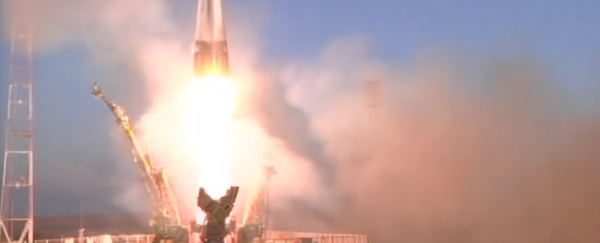
For the first time ever, the UK can celebrate having a representative up on the International Space Station, because this morning, British astronaut Tim Peake made his first visit to the orbiting laboratory, alongside seasoned fliers, Russian cosmonaut Yuri Malenchenko, and NASA astronaut Tim Kopra. As NASA spokesman Dan Hout said during the launch, it was "A flawless flight into orbit today," and you can watch it all in the footage above.
The trio will now spend the next six months in orbit as part of Expedition 46, joining NASA astronaut Scott Kelly and Russian cosmonauts Mikhail Kornienko and Sergey Volko in conducting various experiments in microgravity, with a particular focus on medical research. Speaking with the press today, Malenchenko called it a "very intense research program".
In a few months, Kelly will return home, and Kopra will take over as commander of the ISS for Expedition 47.
The Russian Soyuz rocket launched at 6:03am EST today (1103 GMT), and the journey from liftoff to docking took just 6 hours. According to Sarah Lewin at Space.com, while liftoff went off without a hitch, docking the shuttle to the ISS proved a little more difficult.
"Malenchenko took manual control of the spacecraft after the automated docking attempt was unexpectedly aborted and successfully docked with the station's Russian segment at 12:33 pm EST (1733 GMT)," she says. "The hatches opened to admit the crew into the space station at 2:58 pm EST (1958 GMT)."
This is the first time that the UK has sent someone up to the International Space Station, but as Nick Stockton at Wired points out, chemist Helen Sharman was technically the first Brit in space, having visited the Soviet space station, Mir, in 1991. She told the BBC:
"Launch itself is a day that you want to get on with, because finally, you're getting to do what you've been trained to do for so long. I trained for 18 months, Tim Peake will have trained for six years by the time he flies. You're part of a great big machine… by that stage, the team is so big - the doctors, the trainers - that you're not going to be able to go wrong."
Now that they're up there, the crew will be performing experiments in all fields, ranging from astrophysics to biotechnology, and will often themselves become the subjects of investigation - for example, they're going to figure out how their eyes are affected by microgravity.
Of particular interest is a new medical experiment that involves growing crystals from disease proteins that are too small to see, even under a microscope. These larger crystallised clumps of proteins will allow the astronauts to figure out their atomtic structure so scientists back home can develop new drugs to combat them from the inside-out.
Accrording to Space.com, a furnace will be installed in the Japanese module so the crew can investigate how flame combustion behaves in microgravity, and they'll be testing out an inflatable capsule that could one day be used as a portable habitat orbiting Earth, on perhaps even on the Moon or Mars. Exciting times, we can't wait to hear about the results.
